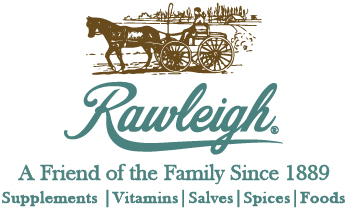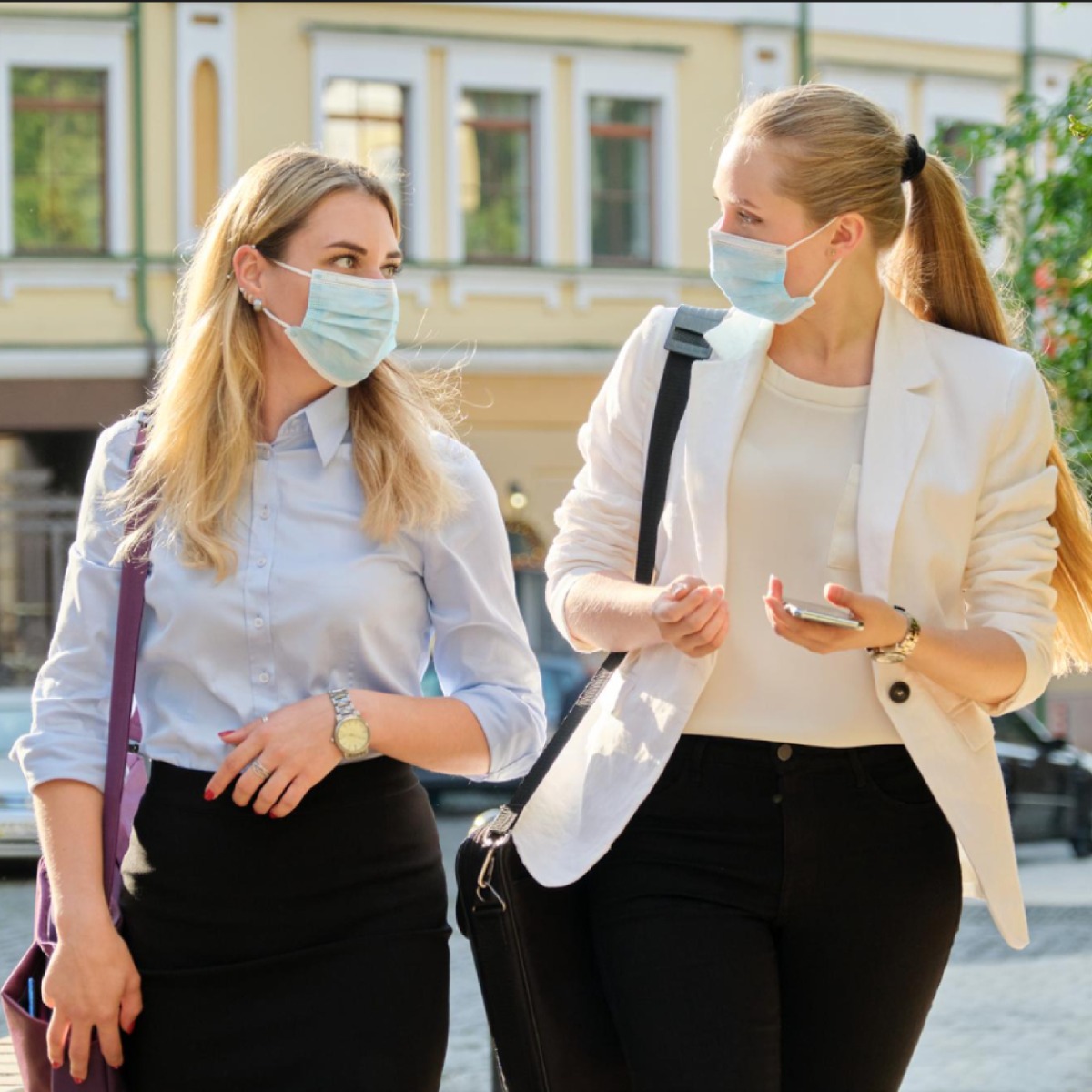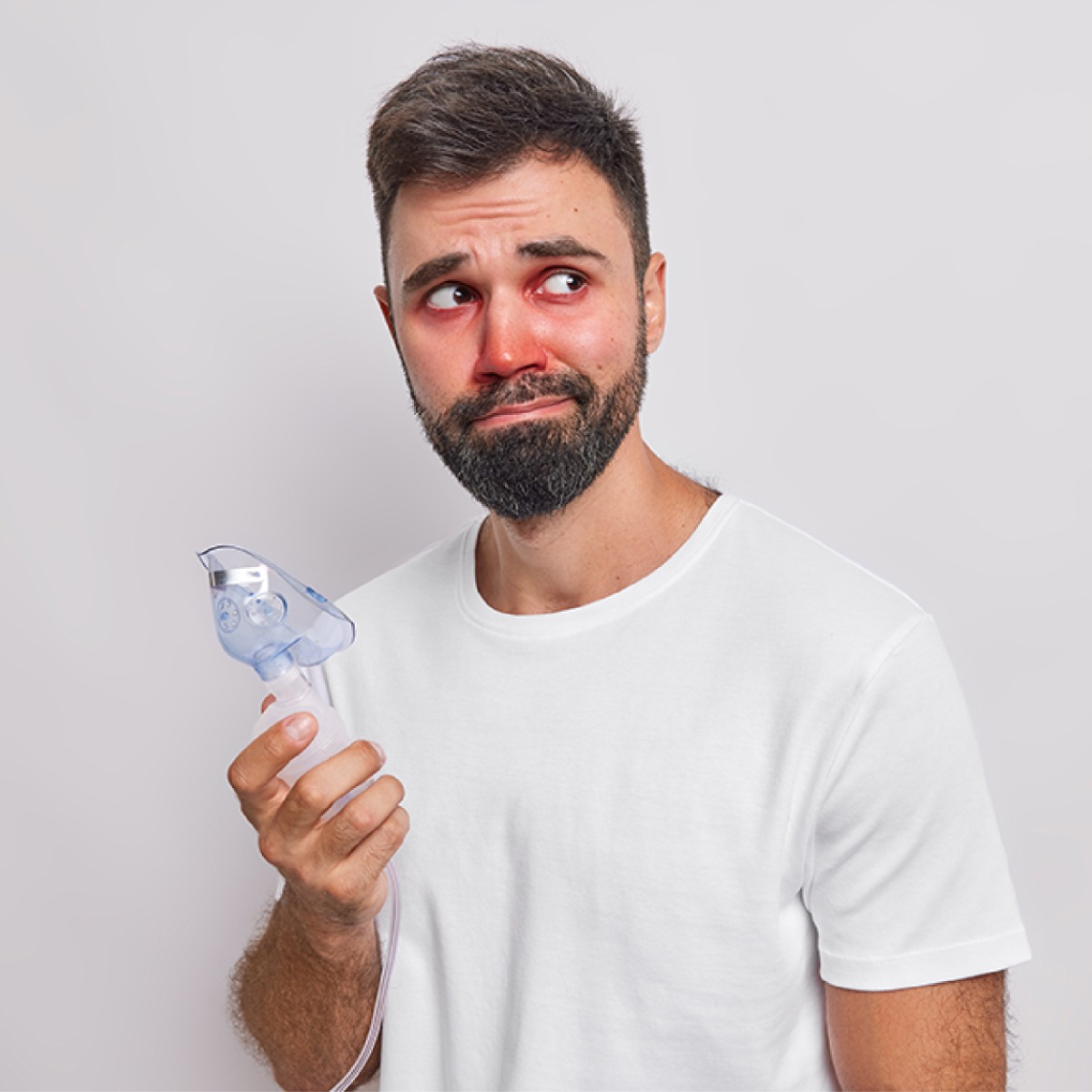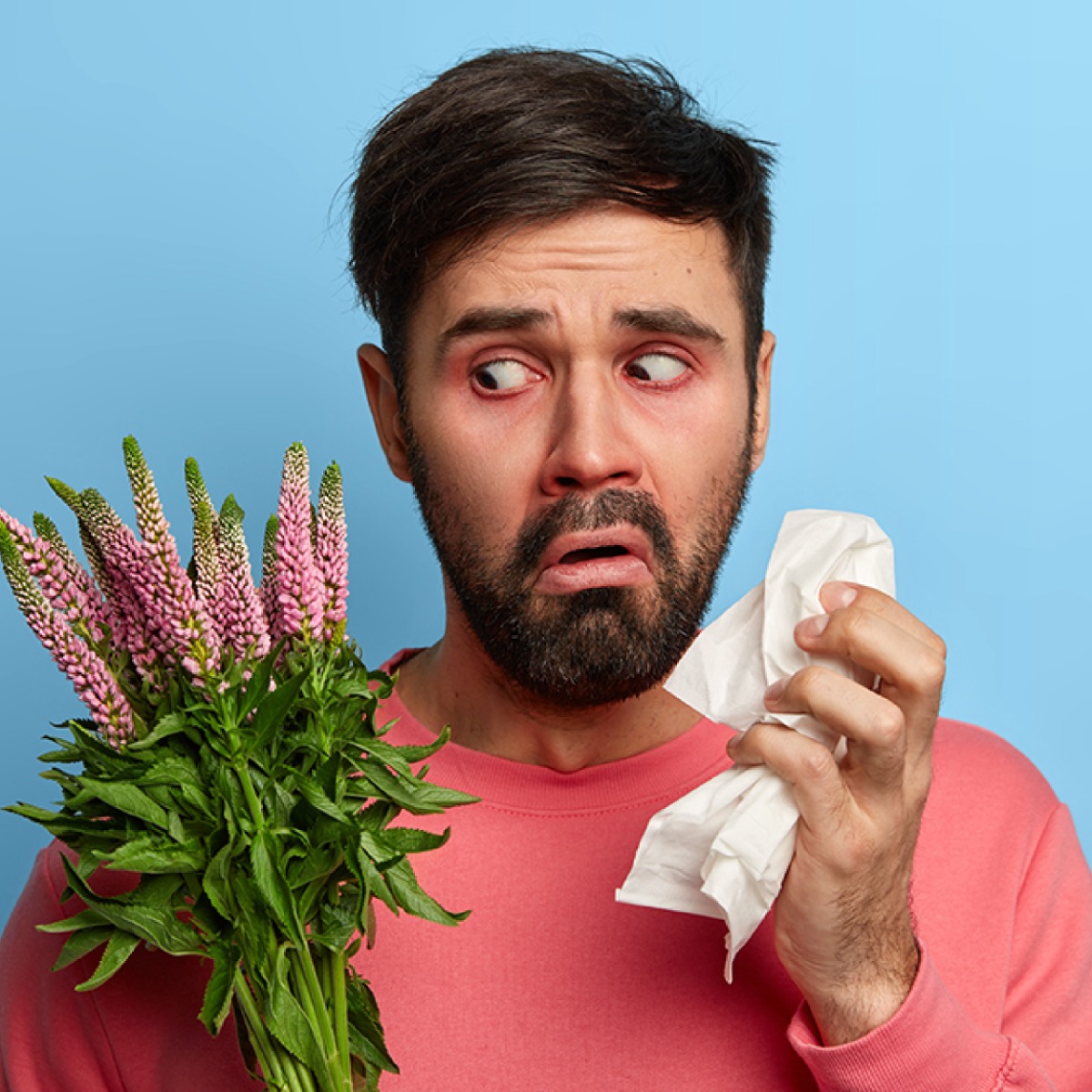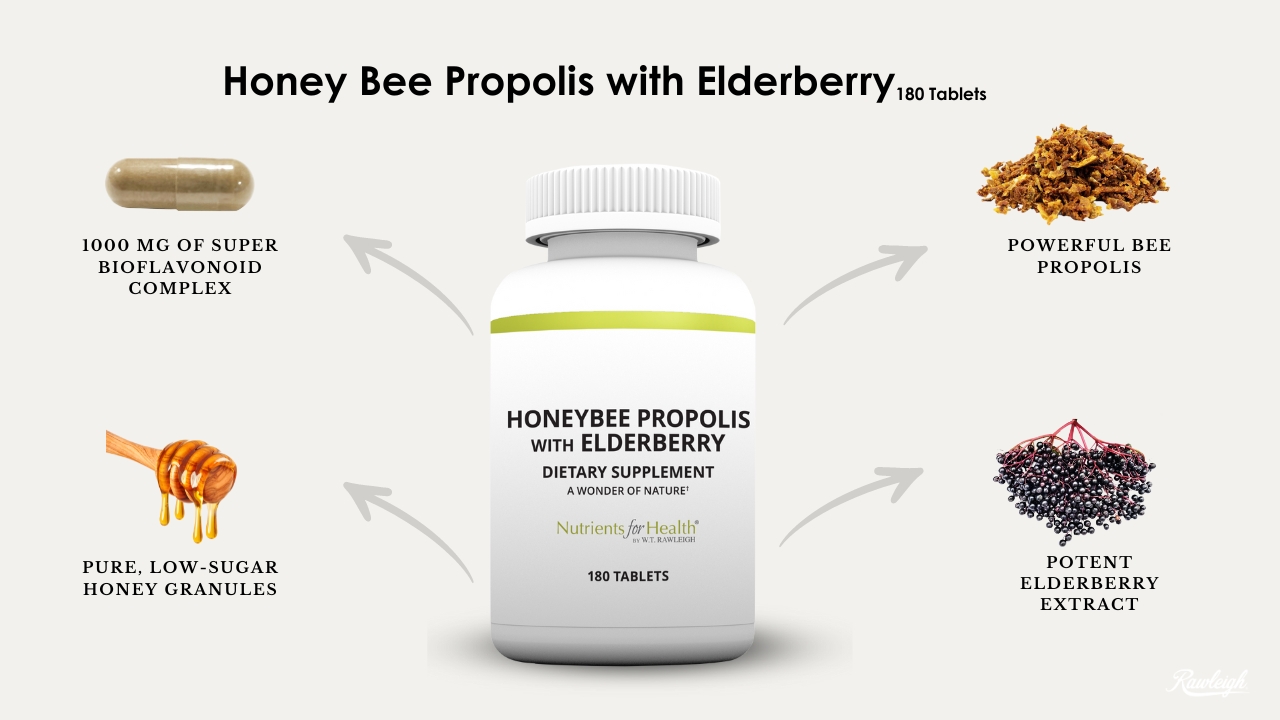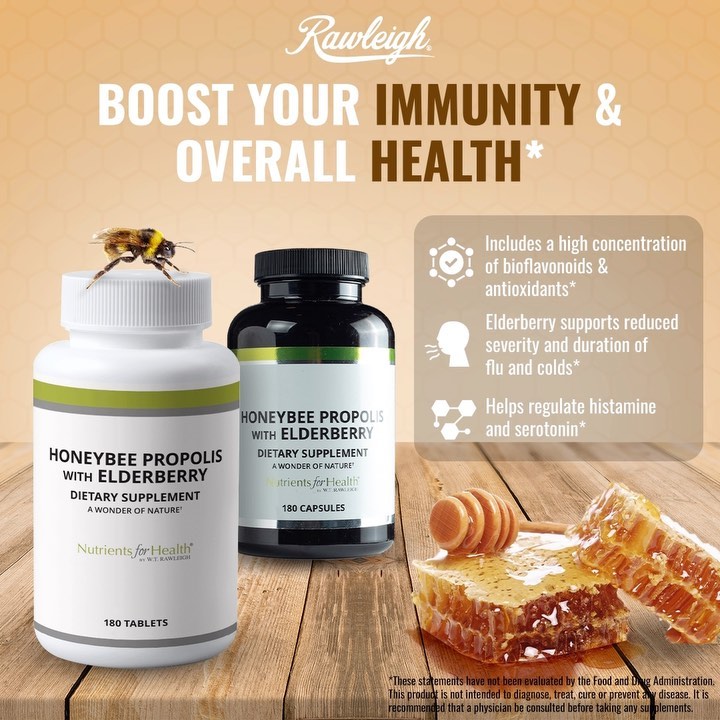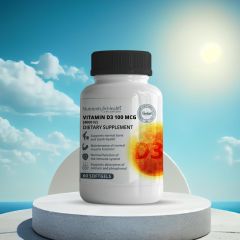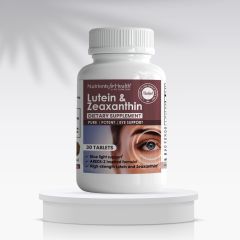Buy Now
W. T. Rawleigh's Honey-bee propolis with Elderberry tablets - from nature's pharmacy
Honeybee Propolis With Elderberry: 180 tablets
Made in USA | Best quality - manufactured in certified GMP facility | Daily dose provides 1000 mg pure, powerful, natural, proprietary blend| Propolis | Elderberry fruit extract | Honey | Super bioflavonoid complex | Nutrition from the beehive - nature's pharmacy | Easy to swallow tablets | Suitable for Vegetarians | Immunity & allergy support *
The word propolis comes from the Greek language “defender of the city”. The bees for millions of years have protected their hives from invasion and infection with a sticky, resinous substance called propolis. The elder bees within the hive gather the propolis from the bark and leaf buds of certain trees and plants. The propolis is brought back to the hive, mixed with wax and saliva to creating a greenish brown rubbery substance with which to seal, polish and coat the interior of the hive. This provides the queen bee with a sterile environment in which to hatch her eggs, and ensures that wind, rain, pollution, bugs and parasites are kept out, as well as bacteria.
Combining nature's purest ingredients Rawleigh has developed this blockbuster formula to support your immune function. *
CDC - Nearly 1 in 3 U.S. adults and more than 1 in 4 U.S. children reported having a seasonal allergy, eczema, or food allergy in 2021, according to new data from CDC’s National Center for Health Statistics ( Jan 26, 2023). Almost 6% of U.S. adults and children have a food allergy, with Black, Non-Hispanic adults, and children one of the most likely to report this type of allergy.
Findings from the adults’ report include:
- About one quarter (25.7%) of adults have a seasonal allergy, 7.3% have eczema, and 6.2% have a food allergy.
- White, Non-Hispanic adults are more likely to have a seasonal allergy (28.4%) compared to Black, non-Hispanic (24%); Hispanic (18.8%) and Asian, non-Hispanic (17.0%) adults.
- The percentage of adults with eczema is higher among women (8.9%) compared to men (5.7%).
- Black, Non-Hispanic adults are more likely to have a food allergy (8.5%) compared to Hispanic (4.4%); White, non-Hispanic (6.2%), and Asian, non-Hispanic (4.5%) adults.
Highlights from the children’s report include:
- Nearly 1 in 5 children (18.9%) have a seasonal allergy, 10.8% have eczema, and 5.8% have a food allergy.
- Boys (20%) are more likely to have a seasonal allergy than girls (17.7%).
- Children 6-11 years are most likely to have eczema (12.1%), followed by children 0-5 years (10.4%), and children 12-17 years (9.8%).
- Black, non-Hispanic children are more likely to have a food allergy (7.6%) compared to Hispanic (5%) and White, non-Hispanic (5.3%) children.
* These statements have not been evaluated by the Food and Drug Administration. This product is not intended to diagnose, treat, cure, or prevent any disease.
Allergens

Crustacean Free

Dairy Free

Egg Free

Fish Free

Gluten Free

Peanut Free

Soy Free

Tree Nuts Free

Sesame Free
- 1 x Pack $44.99 Price ea.
- 2 x Pack $42.74 Price ea.
- 4 x Pack $40.49 Price ea.
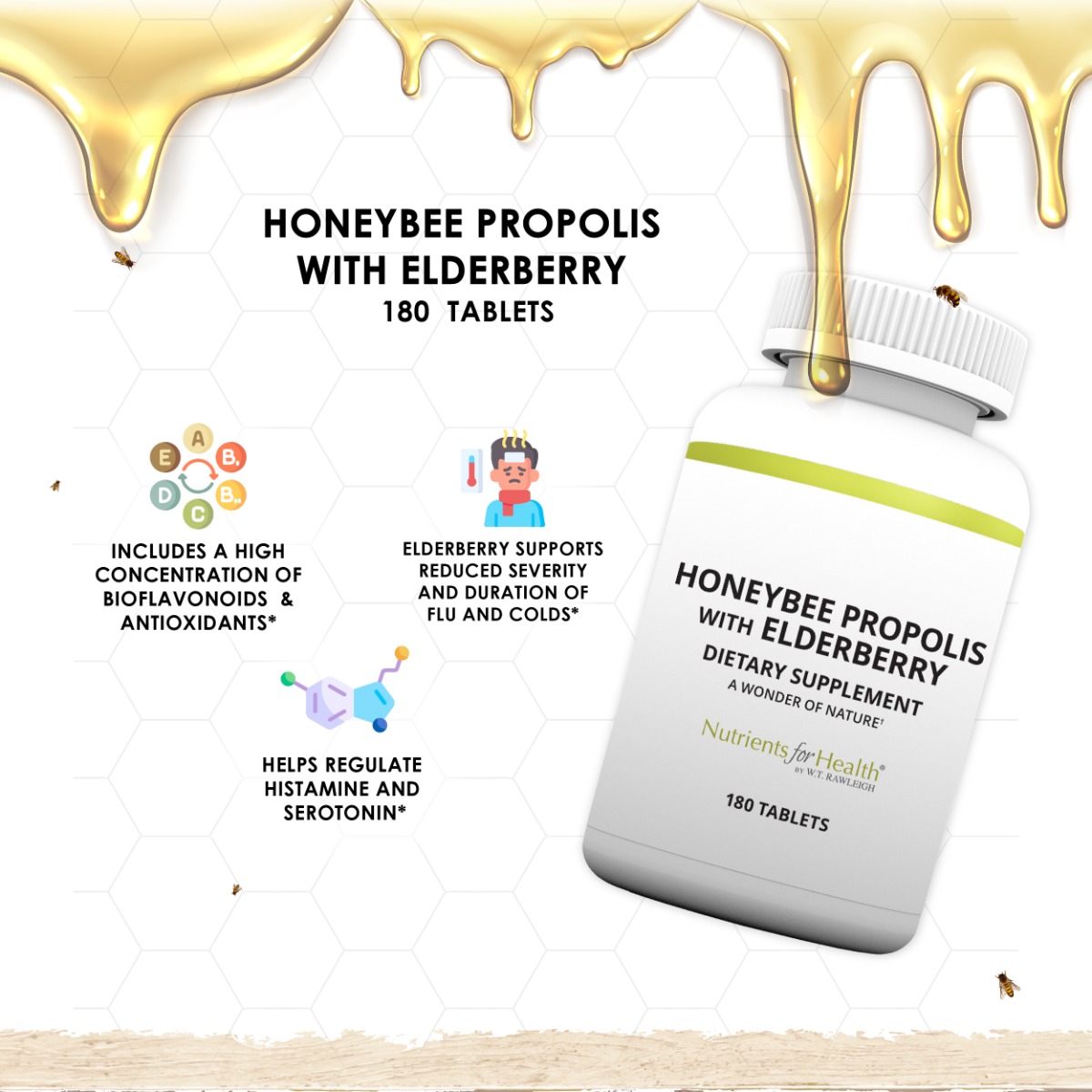
KEY BENEFITS
> Helps regulate histamine and serotonin*
> Includes a high concentration of bioflavonoids & antioxidants*
> Elderberry supports reduced severity and duration of flu and colds*
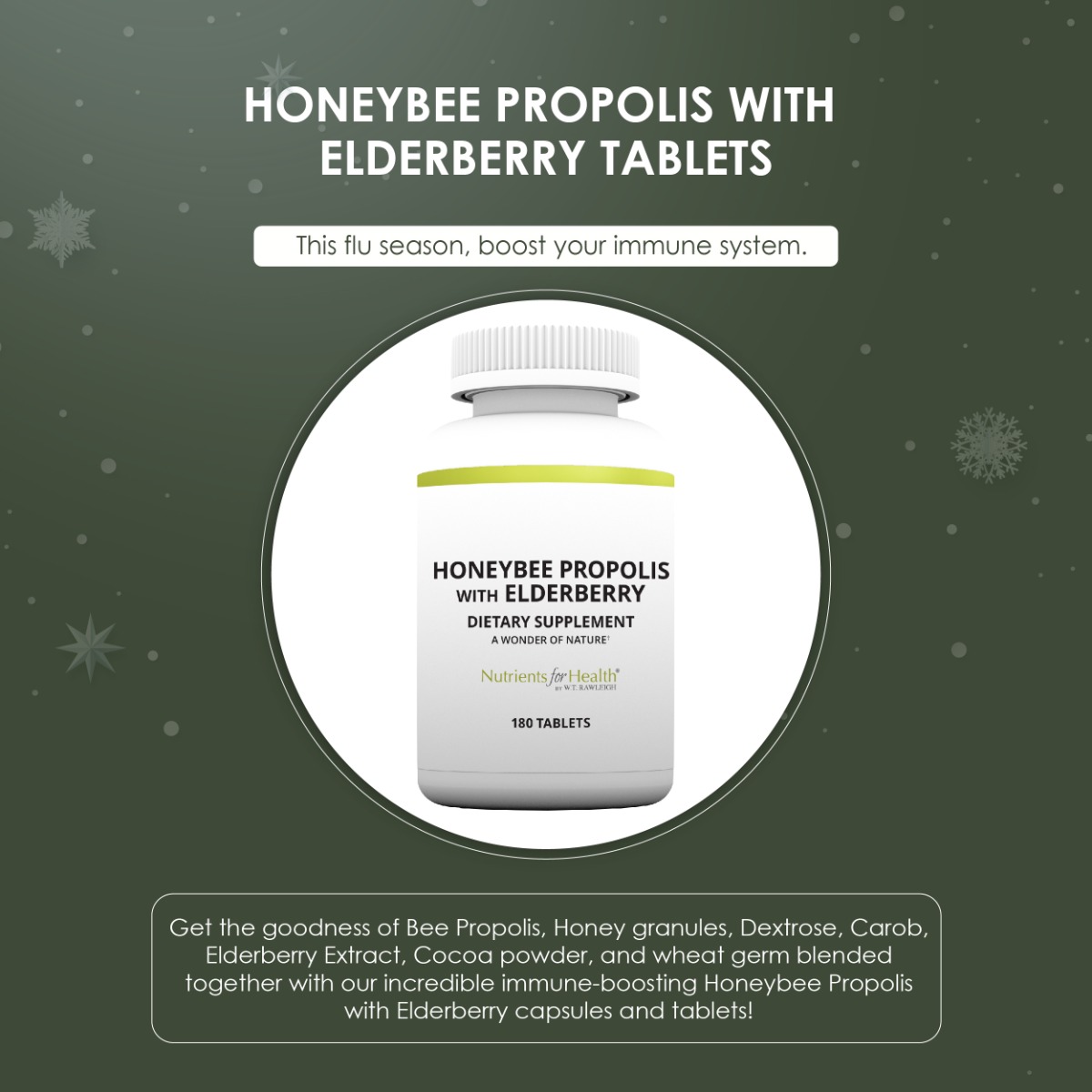
PRODUCT DESCRIPTION
Developed from nature's pharmacy, the beehive, Honeybee Propolis thus offers strong antibiotic, antiseptic, antiviral, anti-fungal, and anti-inflammatory properties. When used daily, it can help build the body's natural resistance to infections and diseases. So get your body the defense it needs!
Building Immunity: Repeated use of antibiotics leads to a decreased resistance to germs. Propolis is both a strong antibiotic and anti-inflammatory among other things which helps build the immune system.*
Allergies: Regulates histamine and serotonin which are required by the body to help cope with allergies.*
Sinus and throat problems: Because of its antiseptic and anti-viral properties it helps with sinus and throat issues.*
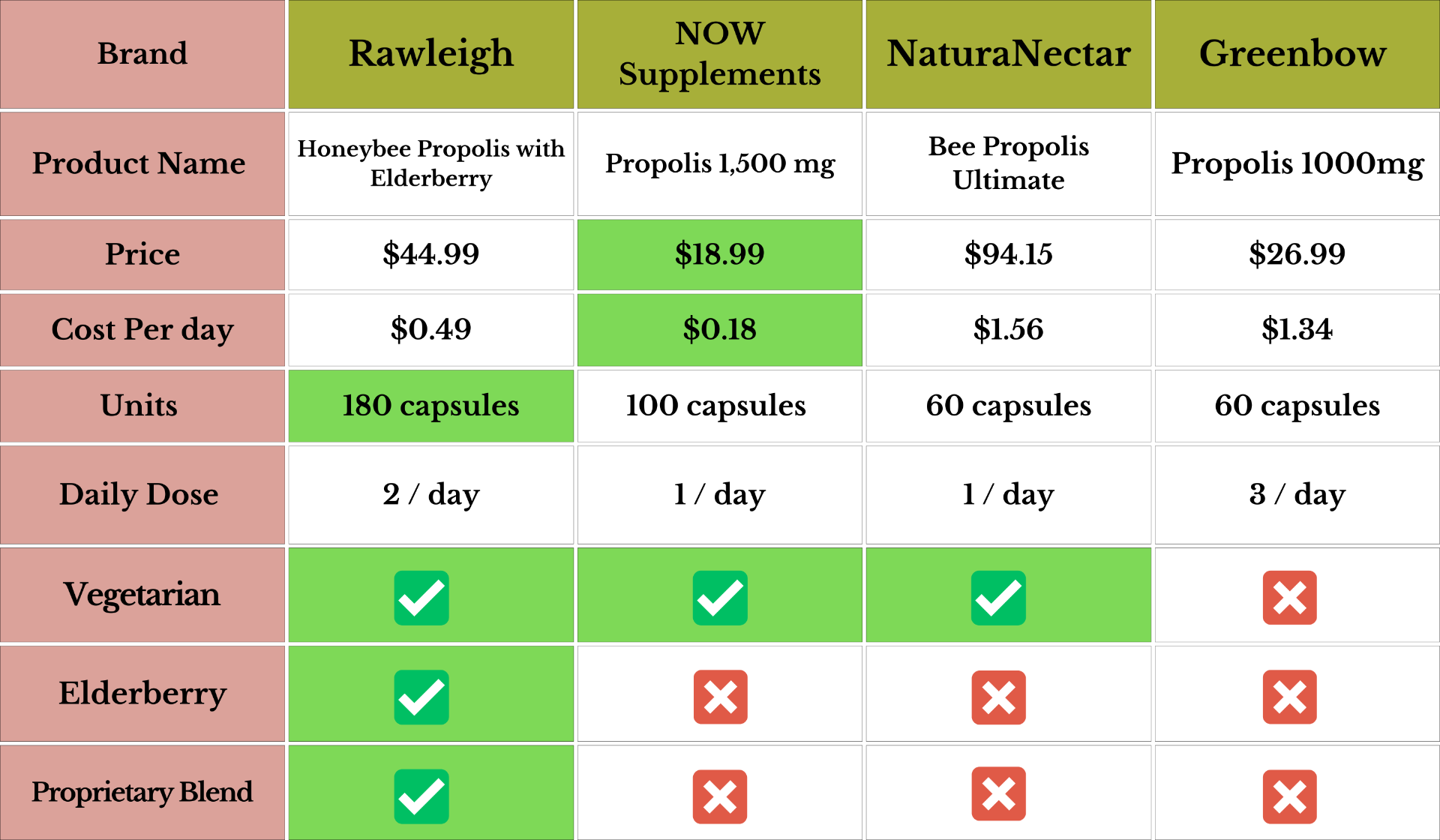
The National Center for Biotechnology Information, on its site www.ncbi.nlm.nih.gov/pmc/articles/PMC5549483/ describes in detail the benefits of propolis. “Propolis is generally known as the “bee glue”, which is a generic name that refers to the resinous substance accumulated by the bees from different types of plants. The word “propolis” is derived from Greek to mean defense for “pro” and city or community for “polis”, or the beehive, in other words. Propolis functions in sealing holes and cracks and for the reconstruction of the beehive. It is also used for smoothing the inner surface of the beehive, retaining the hive's internal temperature (35°C), and preventing weathering and invasion by predators. Furthermore, propolis hardens the cell wall and contributes to an aseptic internal environment. Propolis generally becomes soft and sticky upon heating. It also possesses a pleasant smell. Propolis and its extracts have numerous applications in treating various diseases due to its antiseptic, anti-inflammatory, antioxidant, antibacterial, antimycotic, antifungal, antiulcer, anticancer, and immunomodulatory properties.
Propolis is the third most important component of bee products. It is composed mainly of resin (50%), wax (30%), essential oils (10%), pollen (5%), and other organic compounds (5%). Phenolic compounds, esters, flavonoids, terpenes, beta-steroids, aromatic aldehydes, and alcohols are the important organic compounds present in propolis.
Twelve different flavonoids, namely, pinocembrin, acacetin, chrysin, rutin, luteolin, kaempferol, apigenin, myricetin, catechin, naringenin, galanin, and quercetin; two phenolic acids, caffeic acid, and cinnamic acid; and one stilbene derivative called resveratrol have been detected in propolis extracts by capillary zone electrophoresis. Propolis also contains important vitamins, such as vitamins B1, B2, B6, C, and E, and useful minerals such as magnesium (Mg), calcium (Ca), potassium (K), sodium (Na), copper (Cu), zinc (Zn), manganese (Mn), and iron (Fe). A few enzymes, such as succinic dehydrogenase, glucose-6-phosphatase, adenosine triphosphatase, and acid phosphatase, are also present in propolis.”
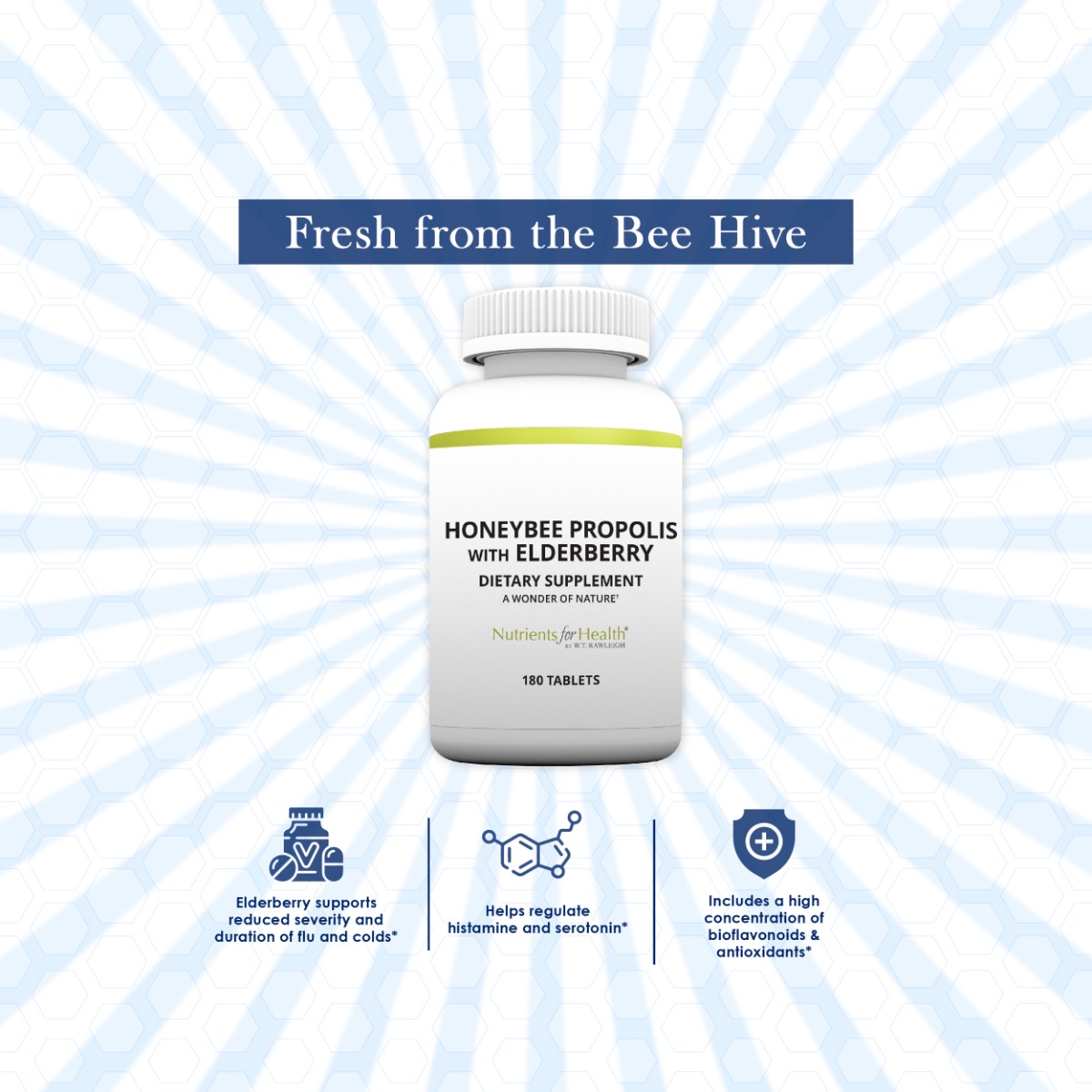
In that same research article, the Center also lists the benefits of propolis as:
Gastrointestinal Disorder
Infection with parasites usually occurs upon contact with an infected surface. The symptoms of a parasitic infection of the GI tract include abdominal pain, diarrhea, bloating, and nausea. Propolis has been reported to have several biological efficacies including anticancer, antioxidant, and anti-inflammatory activities. There are a few studies that reported the clinical use of propolis in the treatment of viral infections. In one study, the in vitro effect of propolis ethanolic extract on the growth and adherence of Giardia duodenalis trophozoites was evaluated. Propolis was shown to inhibit the growth and adherence of the trophozoites. It also promoted the detachment of these parasitic organisms. Its efficacy against giardiasis has also been reported in a clinical study whereby children and adults with giardiasis-given propolis showed a cure rate between 52% and 60%, whereas those given the conventional drug showed a 40% cure rate. Another experimental study showed that propolis has antihistaminergic, anti-inflammatory, antiacid, and anti-H. pylori activities that can be used to treat gastric ulceration.
Gynecological Care
Widespread causes of indicative vaginitis are bacterial vaginosis (BV) and vulvovaginal candidiasis (VVC). The depletion of Lactobacillus spp. in the vagina is a distinguished feature of vaginal infections. The infection is accompanied by an overgrowth of vaginal pathogens such as yeast-like fungi and an elevated vaginal pH. Diabetes patients are more prone to having vaginal infections caused by Candida albicans. A study conducted on the application of 5% aqueous propolis solution resulted in an improvement in vaginal well-being. In addition to providing antibiotic and antimycotic actions, propolis provides early symptomatic relief due to its anesthetic properties. Thus, propolis may be used for Recurrent Vulvovaginal Candidiasis (RVVC) and can be an alternative option for patients who are unable to take antibiotics due to a concurrent pharmacological treatment. The effectiveness of propolis against conventional antifungals has shown satisfactory results. Propolis extract solution (PES) also shows low toxicity in human cells and can be an alternative treatment for chronic vaginitis. In addition, PES has antifungal properties and it can be used as an antibiofilm material for RVVC to counteract the biofilm growth of C. albicans and resistance to antifungal drugs.
Propolis has demonstrated favorable effects in the wound-healing process such as antifungal and antibacterial activities due to its components such as flavonoids, phenolic compounds, terpenes, and enzymes. It also reduces the activity of free radicals (ROS) in the wound bed favoring the repair process. Propolis has also demonstrated great effects on collagen metabolism by increasing the amount of both type I and type III collagen in tissues. The reduction of ROS and accumulation of collagen aid in balancing the extracellular matrix and generating granulation tissues.
CUSTOMER REVIEWS
|
Customer Name |
Review |
Stars |
|
MaryAnn Mikec |
STILL TAKING IT AND I THINK IT IS HELPING.... HAVEN'T FINISHED THE FIRST BOTTLE YET.. BUT, HAVE NOT BEEN SICK AT ALL AND NO VIRUS !!!!! |
4 |
|
Faye Petrack |
I just started with these supplements, But Rawleigh is such a trusted name, I am confident I will be buying more. |
5 |
|
Cody A Mayer |
Has awesome antibiotic properties |
5 |
BLOGS
2. 3 Tips To Celebrate National Senior Citizens Day!
4. Say NO to Spring Allergies!
VIDEOS
Youtube
* These statements have not been evaluated by the Food and Drug Administration. This product is not intended to diagnose, treat, cure or prevent any disease. It is recommended that a physician be consulted before taking any supplements. Results are not typical and may vary.
| SKU | 102227 |
|---|---|
| GTIN or UPC | 850015036262 |
| FAQ | Q: Is it recommended to take Honeybee Propolis during pregnancy or while breastfeeding? A: We recommend that you review all nutritional supplements with your physician prior to use. In particular, pregnant and nursing women should always consult with their primary care physician regarding vitamin intake to ensure that they are not over or under supplementing.* Q: Is Honeybee Propolis safe for children and teenagers? A: It is recommended that you first consult with a qualified healthcare professional. Most recommendations for daily use are based on an adult*. * These statements have not been evaluated by the Food and Drug Administration. This product is not intended to diagnose, treat, cure, or prevent any disease. |
